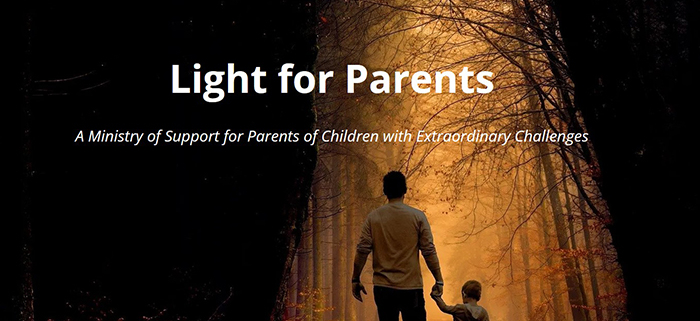Hidden Christians
Do you know most of the members of your congregation—or, at least, do you recognize most of the people who regularly worship at the same time that you do? If you belong to a smaller-sized church and worship regularly, you may be able to answer “yes” to both questions. In a very large congregation, you might not know all of the church’s members, but you may trust that the members of your church staff do.
However, it is very possible—even likely—that your congregation has members who are unknown to most others and possibly pretty unfamiliar to the staff. No, I’m not referring to members who are considered “straying sheep”—who are choosing not to attend worship or be involved in church activities. Nor am I referring to elderly members who once attended regularly but are no longer able to do so. Instead, I’m referring to other Christians who may be hidden from the congregation: parents of children with extraordinary challenges.
Through our work in the Light for Parents ministry, we often hear from parents who very much want to join in worship regularly and feel connected to other Christians, but have found this to be nearly impossible because of their child’s disability, medical condition, or mental health or behavioral challenges. Consider these examples:
- Jim and Kathy realize that their child with sensory processing disorder cannot be in the sanctuary for a worship service because the sounds are so loud or the lights so bright that the setting becomes overwhelming.
- Adoptive parents Tom and Grace know that their child, who has a history of being abused, is likely to be frightened by the crowd or by certain people in the sanctuary who appear scary, resulting in “fight or flight” behaviors.
- Matt and Laura are concerned that their child who has a disability will loudly make involuntary grunting noises or call out words at random times, disrupting the service.
- Sarah and Kevin, parents of a child with ADHD, know from experience that their child will not be able to stay in the pew for the duration of the service, but will need to walk around or even run during that time.
- Kelly and Jacob are worried that their child, who has frequent meltdowns due to autism spectrum disorder, may have a meltdown at church.
- Bill and Hannah, parents of a child with a medical condition that severely weakens their child’s immune system, are concerned about exposing their child to so many people in a relatively small space.
- Greta and Phil, whose child is difficult to move from one place to another due to a physical disability, are exhausted from caring for their child’s needs each day and unable to imagine adding another difficult trip: the journey from home to church and back.
*All names have been changed.
These are just a few examples of parents who struggle to find opportunities to worship in church or get to know other congregation members. They stay in the background, often becoming very isolated from their fellow Christians. They are hidden within congregations.
These parents would love to be present at worship services. They would love to have the friendship and support of other Christians. They would love to serve others outside their homes. And they would love to have their children participate in the various children’s ministries that their church homes offer. Yet they remain hidden.
God tells us “Carry each other’s’ burdens, and in this way you will fulfill the law of Christ” (Galatians 6:2, NIV). Now that you now about these “hidden Christians,” would you like to know how you can help carry their burdens and make it possible for them to play a greater role within the congregation? The first step is awareness—learning which parents in your congregation are isolated because of their children’s challenges and asking them their needs. Try saying, “I would truly appreciate the opportunity to be a blessing to you. How can I be helpful?”
The next step is making your worship services and children’s ministries accessible to all. This involves more than just having special parking spaces and ramps available. It involves letting isolated families in the congregation know that you truly want to make it possible for them to worship, and then building a circle of support around them and meeting their family’s worship and children’s ministry needs. As you do so, you may find that your congregation will begin to get a reputation as one that is very welcoming to all, and your ministry may grow as a result!
How to carry this out is a big topic, but Light for Parents is here to help. We have speakers available who would be happy to come share with your pastors, staff ministers, teachers, children’s ministry staff, and all members ways that your congregation can better open its arms to families of children with extraordinary challenges. A partial list of available topics can be found at www.lightforparents.com/speaking. Let us help you learn how you can be a blessing to your “hidden Christians”—and how they can be a blessing to you as well!
Written by Jane Mose
Light for Parents Program Coordinator
SUBSCRIBE TO HIS HANDS
Get Special Ministries news and updates right to your inbox.
SUPPORT SPECIAL MINISTRIES
Support the ministry work of WELS Special Ministries.

